Iran slams NATO's warning on missile support to Russia
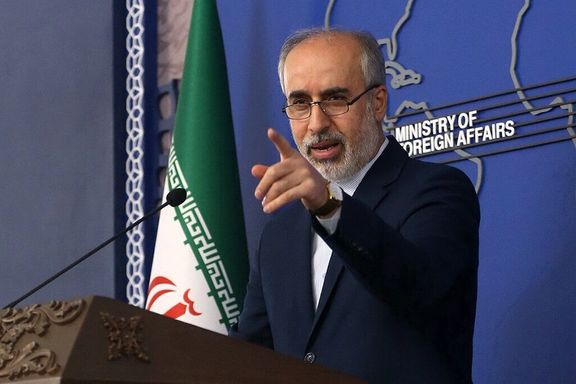
Iran denounced the North Atlantic Treaty Organization (NATO) summit statement warning Iran against sending ballistic missiles to Russia, calling it "entirely baseless and politically motivated."

Iran denounced the North Atlantic Treaty Organization (NATO) summit statement warning Iran against sending ballistic missiles to Russia, calling it "entirely baseless and politically motivated."
“Linking the Ukraine conflict to Iran-Russia cooperation is a politically motivated move aimed at justifying Western intervention and continued military aid to Ukraine,” foreign ministry spokesman Nasser Kanaani stated on Thursday.
NATO leaders issued a stern warning to Iran on Wednesday, cautioning against the transfer of ballistic missiles to Russia, labeling it a significant "escalation" in Tehran's support for Russian aggression in Ukraine.
The alliance between Iran and Russia has strengthened due to the Ukraine conflict which has prompted extensive global sanctions on both Iran and Russia.
Iran has supplied Russia with hundreds of kamikaze drones, and unofficial reports suggest Tehran may be contemplating further assistance with missiles.
In February, Reuters reported that Iran had supplied Russia with “a large number of powerful surface-to-surface ballistic missiles.” UK defense secretary Grant Shapps later echoed this claim, indicating he had such information but withheld details.
Although Iran denied providing the weapons and the US could not confirm the transfers, it assumed Tehran intended to supply missiles to Moscow.
Recent satellite imagery published by Reuters showed significant expansions at two key Iranian ballistic missile facilities, which researchers believe are aimed at boosting missile production with sources indicating missile components would be sold to Russia.
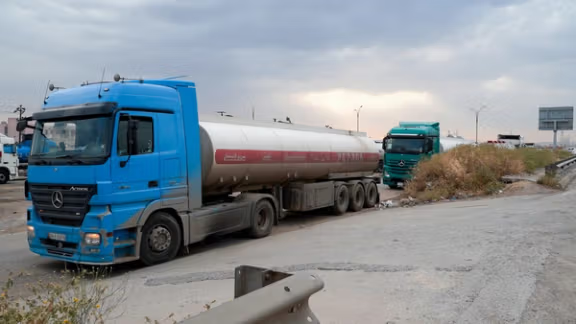
Heading for Turkey to the north and Iran to the east, hundreds of oil tankers snake each day from near Kurdistan's capital Erbil, clogging the Iraqi region's often winding and mountainous highways.
The tankers are the most visible aspect of a massive operation to truck oil from the semi-autonomous region of Iraq to Iran and Turkey in murky, off-the-books transactions that have boomed since an official export pipeline closed last year.
Reuters pieced together the details of this flourishing trade through conversations with over 20 people including Iraqi and Kurdish oil engineers, traders and government officials, politicians, diplomats and oil industry sources.
They painted a picture of a booming business in which more than 1,000 tankers carry at least 200,000 barrels of cut-price oil every day to Iran and, to a lesser extent, Turkey - bringing in about $200 million a month.
The scale of the unofficial exports, which has not previously been reported, is one reason Iraq has been unable to stick to output cuts agreed with the OPEC oil cartel this year, Iraqi officials said.
Iranian and Turkish officials did not respond to requests for comment.
Iran’s deputy road and urban development minister, Jalil Eslami, told ILNA news agency in Tehran on Thursday that oil from Iraqi Kurdistan transits through Iran and exported via the Persian Gulf. He provided no numbers or any other details.
Iraqi oil ministry spokesperson Assim Jihad said the Kurdistan trade was not approved by the Iraqi government and state oil marketer SOMO was the only official entity allowed to sell Iraqi crude.
He said the government did not have accurate figures for how much oil was being smuggled into Iran and Turkey.
"OPEC now has less patience for smuggling and has even been known to slap punitive measures on offending members. I doubt we'll see any retribution against Baghdad because it's well known that the Kurdish region lies outside central control," said Jim Krane at Rice University's Baker Institute in Houston.
The business could also put Kurdistan on a collision course with close ally Washington, as it assesses whether the trade breaches any US economic sanctions on Iran, according to a US official.
Until last year, Kurdistan exported most of its crude via the official Iraq-Turkey Pipeline (ITP) running from the Iraqi oil city of Kirkuk to the Turkish port of Ceyhan.
But those exports of about 450,000 barrels per day (bpd) halted in March 2023 when an international tribunal ruled in favor of the Iraqi federal government's call for the shipments to stop - leaving the pipeline in legal and financial limbo.
The federal administration in Baghdad, which has long held that it is the only party authorized to sell Iraqi oil, successfully argued that Turkey arranged the exports with the Kurdistan regional government without its consent, in breach of a 1973 treaty.
'NO TRACE'
Tankers soon started taking Kurdish oil to neighboring countries instead and the business accelerated this year after talks to reopen the pipeline stalled, industry sources, oil officials and diplomats said.
Local officials said none of the proceeds are accounted for, or registered, in the coffers of the Kurdistan Regional Government (KRG), which has been struggling to pay thousands of public employees.
"There is no trace of the oil revenues," said regional lawmaker Ali Huma Saleh, who was chair of the oil committee in Kurdistan's parliament until it was dissolved in 2023. He put the trade at over 300,000 bpd, higher than most other estimates.
Hiwa Mohammed, a senior official in the Patriotic Union of Kurdistan (PUK), one of Kurdistan's two ruling parties, said the oil was going through border crossings with the knowledge of the regional and federal governments.
KRG Treasury officials did not respond to requests for comment. The KRG Ministry of Natural Resources, which oversees oil trading in Kurdistan, does not have a spokesperson.
A US official said Washington was looking at the oil trade to assess compliance with sanctions on Iran.
The US Treasury Department declined to comment.
A State Department official said: "US sanctions on Iran remain in place, and we regularly engage with partners on sanctions enforcement issues, but we do not detail those conversations."
A senior official at Kurdistan's natural resources ministry said oil production in the region was running at 375,000 bpd, of which 200,000 was trucked to Iran and Turkey, and the rest refined locally.
"Nobody knows what happens to the revenues from the 200,000 smuggled abroad, or the oil derivatives sold to refineries in the region," said the official, who declined to be named because the sensitivity of the matter.
CUT-PRICE CRUDE
The crude is sold by oil companies in Kurdistan to local buyers at cut-price rates of $30 to $40 a barrel, or about half the global rate LCOc1, which equates to at least $200 million a month in revenue, industry and political sources said.
Kurdistan's oil production is majority controlled by eight international oil firms: DNO ASA DNO.OL, Genel Energy GENL.L, Gulf Keystone Petroleum GKP.L, ShaMaran Petroleum SNM.V, HKN Energy, WesternZagros, MOL's MOLB.BU Kalegran and Hunt Oil Company.
Hunt Oil, based in the United States, declined to comment. The other seven companies did not respond to requests for comment, nor did local company KAR Group, a major player in Kurdistan.
While most oil production halted when the pipeline closed, some companies including DNO, Keystone and ShaMaran have said in statements they have since started producing crude for sale to buyers within Kurdistan.
ShaMaran said the average price of oil it sold in the first three months of 2024 was $36.49 per barrel while Keystone said in June that sales of crude from the Shaikan Field this year were bringing in about $28 a barrel.
The industry sources said approved local buyers take the crude from oil companies and sell it on through middlemen for export, without the knowledge of the producers.
The vast majority of the trucked oil goes to Iran, most of the industry and political sources said, via official Iraqi border crossings including Haji Omaran, or via Penjwen further south.
From there, it is loaded onto ships at Iranian ports in the Gulf at Bandar Imam Khomeini and Bandar Abbas - a trade route used in the past for Kurdish oil exports - or transferred by road to Afghanistan and Pakistan, industry, political and diplomatic sources said.
Reuters could not determine what Iran, which faces difficulties selling its own oil products because of sanctions, gets out of the trade, nor who is receiving the oil in Iran.
The PUK's Mohammed said it was sent to Iran to be refined into gasoline.
Pakistan's petroleum ministry declined to comment. Afghan officials did not respond to requests for comment.
BLACK-MARKET LABYRINTH
The trade is the latest iteration of a long-standing Iraqi black-market oil business widely seen as benefiting political elites who are closely linked to business interests.
Twelve people said officials in Kurdistan's two ruling parties, the Kurdistan Democratic Party (KDP) of the Barzani clan and the PUK of the Talabani clan, were the beneficiaries.
"There is a labyrinth of black-market salespeople getting paid, and people approving those sales. It's not that they are just looking the other way. They're taking their share," an industry source working in the Kurdish oil trade said.
A senior diplomat in Baghdad said political interests were so vested in the trade that resuming official exports via the pipeline, once seen as a priority, had dropped down the diplomatic agenda.
"I'm not going to be advocating for this while they're all having a party," the person said.
KDP officials did not respond to requests for comment about the black-market trade. Mohammed, the PUK official, did not comment on who might be behind it.
Kurdish officials say the region was forced into the trade by the pipeline closure, which they see as part of a broader effort by Iran-backed Shi'ite parties in Baghdad to curb the relative autonomy they have enjoyed since the end of the first Gulf war in 1991.
A senior Iraqi parliamentary official familiar with oil matters said Baghdad was aware of the details of the business but was avoiding public criticism as officials seek to resolve outstanding disputes with Erbil.
Putting pressure on Erbil to stop oil smuggling would corner the region and deprive it of all sources of funding, which could result in its collapse, said the person, who declined to be named due to the sensitivity of the issue.
The trade has been cited privately by Iraqi officials as being behind Baghdad's inability to stick to its OPEC production quotas, a bone of contention with OPEC's de facto leader Saudi Arabia.
Jihad, the oil ministry spokesman, said Iraq, which has pledged to scale back output this year to make up for the overproduction, was committed to voluntary production cuts.
For now, the sheer volume of tankers snarling up highways, and getting involved in accidents, is angering residents along major thoroughfares.
"It's very painful," said Rashid Dalak, visiting the grave of his brother Rouzkar, who was killed in a crash with a tanker in May on the highway between Erbil and Sulaimaniya that leads to the Iranian border.
"Despite passing through and damaging our roads and killing our loved ones ... no-one here has seen a dollar."
(Report by Reuters)
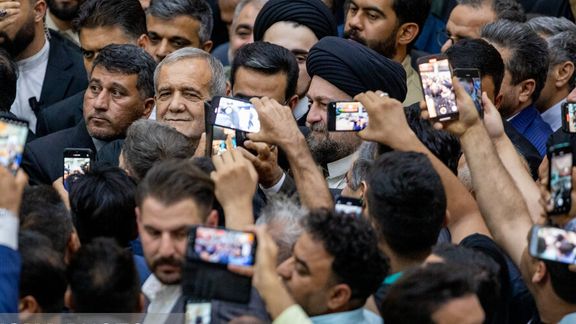
Iran’s president-elect Masoud Pezeshkian is facing several serious challenges nearly all of which are linked to the country's long-standing foreign policy impasse and the problem of sanctions.
Before even beginning to tackle those problems, Pezeshkian warned the interim government under vice president Mohammad Mokhber to avoid creating new problems by signing contracts with individuals and organizations and creating long-lasting financial commitments for the new government.
Before the letter was sent, news was going around that Raisi's legacy government has been hiring and firing individuals, and entering into long-term contracts with some public and private sector entities during the past week.
Meanwhile, Iranian media enumerated up to six problems the new government has inherited from President Ebrahim Raisi’s administration. A voluminous dossier about every one of those problems will be on Pezeshkian's desk once he officially takes office at the end of July.
Many of those problems are the outcome of sanctions as well as mismanagement and indecision by the previous government. A bigger problem for the new government is that the annual budget for the coming year has been already finalized and there is very little it can do to address a huge deficit and major spending decisions.
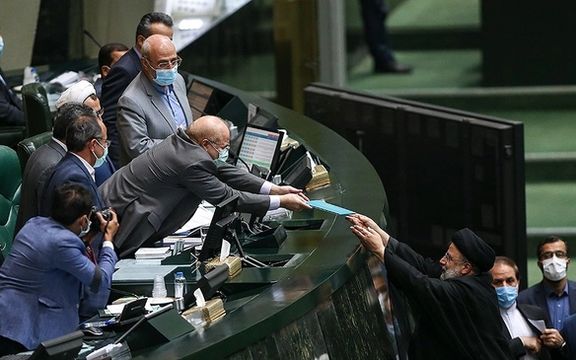
In fact, the first problem Pezeshkian will face is the budget deficit. The government still owes money to banks and other organizations for debts dating back to 2022 and even before. Since the United States imposed oil export sanctions in 2018, the government’s main source of revenue was badly affected.
The Raisi administration lacked financial discipline, according to Rouydad24, pro-Pezeshkian news website in Tehran. It spent more foreign currency in 2022 and 2023 than it earned.
Only the Ministry of Agriculture has spent more than $20 billion on importing essential commodities while it was allowed to spend $15 billion. A large part of this debt remains for the years to come. On the other hand, pharmaceutics and machinery importers have been facing big losses because of mismanagement of funds as well as losing the trust of their trade partners abroad. All of these debts and shortfalls need to be addressed by the Pezeshkian administration in 2024.
Businesses in Iran predict that the government will be in trouble paying for the import of essential commodities this year, particularly as China has not been introducing any discipline in repatriating several billion of dollars of Iran's oil money, according to Tehran media.
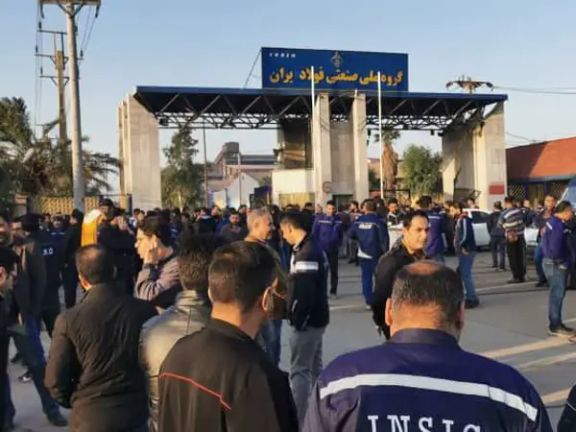
The second issue the new government has inherited is the challenge of adjusting pay for millions of retired government employees and military personnel. In recent years, not a day has passed in Iran without protest demonstrations by pensioners. Despite this ongoing unrest, no solution appears to be on the horizon.
The third problem is about Iran's ailing industrial infrastructure and its need for investment. Industries are short of financial resources and do not have any hope of attracting any capital. The government's solution has been printing money and expanding the monetary base, which exacerbates an already 50% annual inflation. This has eaten away at workers’ real incomes, leaving them deeply disgruntled and restless.
Aging public infrastructure is the fourth major issue. Iran lacks a sufficient transportation fleet, relying on up to 10,000 Afghan trucks to help transport goods. The shipping industry is nearly non-existent and fraught with problems, including a shortage of containers. Consequently, unloading cargo can take anywhere from 45 days to 6 months.
The fifth problem is the issue of taxes. Businesses are unhappy about rising taxes and the difficulties created by inefficient tax collection software. At the same time, the government has not been successful in dealing with tax evasion and this has made an additional burden for real taxpayers. The last issue mentioned by the press is inefficient and even harmful regulation inhibiting the healthy functioning of capital markets.
Despite these challenges, a group of economists and social scientists in Iran have expressed hope that Pezeshkian's administration presents one of the last peaceful opportunities for solving the country’s problems. These experts have their doubts about the country's future under Pezeshkian. They note that the presidential debates revealed that while two groups in Iran emphasize ideological and economic solutions for the nation's issues, neither assumes responsibility for the country's plight, despite both having been in power over the past 45 years.
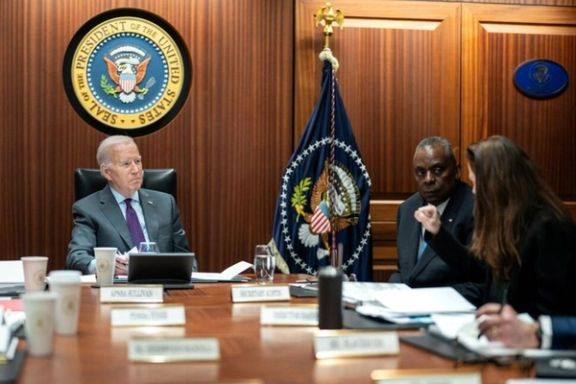
The Biden administration is under scrutiny for failing to submit a legally mandated report on Iran's nuclear program amid accusations of being too soft on Iran.
Senator Lindsey Graham (R-SC), who co-authored Public Law 117-263, Section 5593 of the Iran Nuclear Weapons Capability and Terrorism Monitoring Act of 2022, accused the administration of violating the law by missing crucial deadlines, according to the Wall Street Journal.
The law mandates a biannual assessment to Congress on Iran’s uranium enrichment and nuclear weapons development progress which led the United Nations' nuclear chief to admit recently that Iran is "weeks not months" away from a nuclear weapon.
In a letter to Avril Haines, the Director of National Intelligence, Senator Graham stated that the administration is "in violation of the law" for missing two Section 5593 assessment deadlines in the past year and failing to submit Section 7413 assessments when Iran reaches major enrichment thresholds.
The White House has long been under fire for taking too soft an approach to Iran as it appears reluctant to address Iran’s actions and avoid increased tension before the November election.
While the US has imposed sanctions against Iran, not only has Iran's nuclear program reached levels way beyond global regulations, but its ability to evade sanctions has seen its illicit oil sales spike since President Joe Biden took office, in turn funding its terror operations globally.
The White House has also been criticized for not adequately informing the public about Iran’s involvement in regional conflicts, including the war in Gaza, Houthi attacks on commercial shipping, and assaults on US bases in Iraq, Syria, and Jordan.

Iran's President-elect Masoud Pezeshkian will be officially inaugurated on Sunday, July 28, as the next president in a ceremony called Tanfiz, hosted by Supreme Leader Ali Khamenei.
Two days later, he will take the oath of office in the parliament, during a ceremony called Tahlif in the Constitution.
There are several steps until the president-elect can be called Iran’s President.
After the election, the Guardian Council should confirm the validity of the results, ensuring that the election process followed legal precepts. Then, it issues a certificate of appointment for the president-elect.
This document should be signed by the members of the Council and then sent to the Supreme Leader, who would announce the date for Tanfiz, when he officially endorses the election results and ratifies the new president. It is followed by Tahlif, or the swearing-in ceremony, which usually happens within a few days.
The president will then have 15 days to present his proposed ministers to the parliament for a vote of confidence, which is reportedly set to be held on September 5.
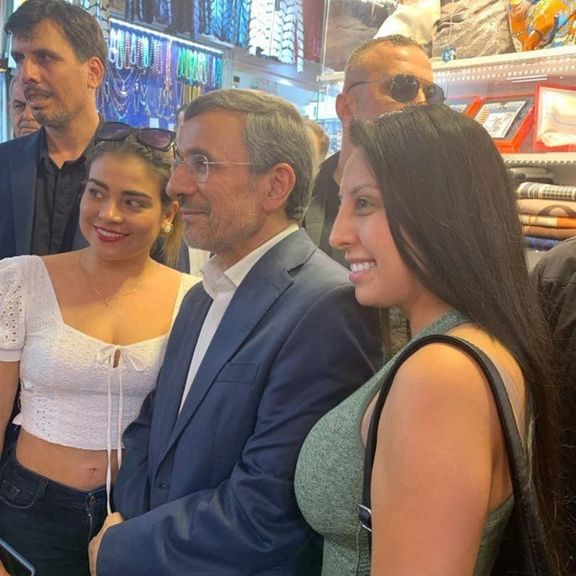
Mahmoud Ahmadinejad's recent trip to Turkey has sparked contrasting reactions, with Turkish and Iranian media offering divergent views on the controversial former Iranian president's visit.
Iranian media has focused its criticism on Ahmadinejad, particularly highlighting his photos with women not wearing hijab. One outlet, citing a state media host, wrote, “Mr. Ahmadinejad, we are not extremists, but can you justify such pictures with women dressed like this and without hijab?”
The news website went on to say, “When the former president of an Islamic country permits women dressed in such attire to take pictures with him, and these images go viral on social media, it can only suggest that he embraces liberalism and populism."
According to Dolat Bahar, a Telegram channel run by Ahmadinejad's supporters, his visit was purportedly in response to an official invitation from a technological university for a "four-day scientific and cultural visit."
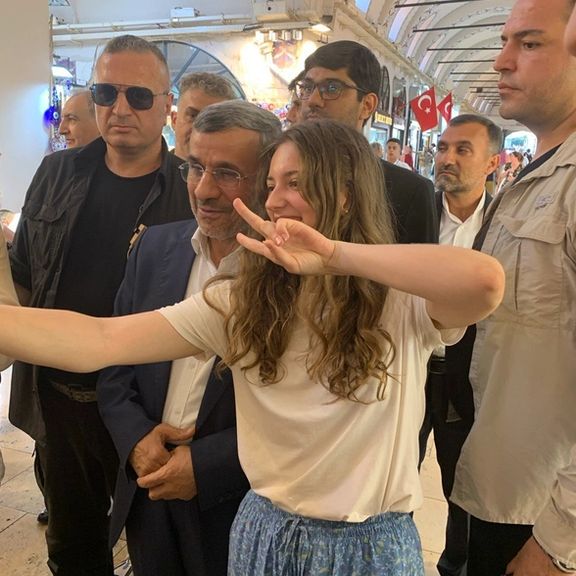
The channel posted numerous images of people taking photos with him on the streets of Turkey, including women without hijabs. Two of these pictures were featured in Iranian media, albeit with their bodies censored.
Mehrdad Farahmand, a Middle East analyst and political commentator based in Istanbul, told Iran International that many ordinary individuals in the Middle East, as opposed to the elite, particularly in Turkey, largely admire Ahmadinejad for his staunch opposition to the US and Israel.
Farahmand, a former BBC correspondent in the Middle East, said: “While the authorities in these countries typically refrain from advocating for cutting ties with the US and Israel, Ahmadinejad was notably vocal about these issues during his presidency.”
“His outspoken rhetoric and Iran's pursuit of nuclear capabilities were widely associated with his leadership. Ahmadinejad's rhetoric about eliminating Israel, despite being costly and widely opposed by the Iranian populace, nevertheless garnered substantial support from certain segments of the population [in the region],” he added.
Another focal point for Iranian media was the timing of his departure on the day of the runoff presidential election. They argued that there is no evidence that he voted, interpreting his departure and announcement on that day as evidence of a deliberate boycott.
“He did not participate in the first round of the elections, and in the second round, there is neither a record nor a report of his presence at the Iranian consulate in Istanbul to cast his vote,” news outlet Roudad24 wrote.
They also highlighted the politicians he met in Turkey, suggesting he associated with individuals of dubious reputation. Ahmadinejad met with Turkey’s former Interior Minister Abdülkadir Aksu and Mustafa Destici, the current leader of the Great Union Party.
This is while Farahmand described Aksu as a prominent figure within the Justice and Development Party, which has maintained its position as the ruling party since 2002.
Farahmand also characterized the Turkish media's coverage of Ahmadinejad's trip as positive, noting that his interview on TGRT Haber, a nationwide TV channel, was favorable and free from challenging questions.
During the interview, Ahmadinejad was questioned about the potential for a third world war. In response, he emphasized his stance as a proponent of peace, presenting himself as a seasoned politician dedicated to advocating for global harmony and conflict resolution.
Ahmadinejad, who has been barred from running in the past three presidential elections by the Guardian Council, controlled mainly by Supreme Leader Ali Khamenei, is believed to have registered for candidacy primarily to demonstrate his support base. Just before his most recent disqualification by the Guardian Council, he visited Tehran's Bazaar, where many supporters rallied around him. Following his initial disqualification, the former foreign policy hardliner began openly criticizing the political apparatus established by Ali Khamenei, even going so far as to challenge the Supreme Leader himself directly.